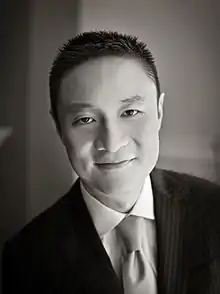Eric X. Li
Eric Xun Li (born 1968; Chinese: 李世默; pinyin: Lǐ Shìmò)[2] is a Chinese venture capitalist and political scientist. He is the founder of Chengwei Capital, founder of Guancha.cn Chinese: 观察者网), and a trustee of the China Institute at Fudan University.[3][4]
Eric Xun Li | |
|---|---|
 | |
| Born | Li Shimo (李世默; Lǐ Shìmò) 1968 (age 52–53) |
| Citizenship | People's Republic of China[1] |
| Alma mater | |
| Occupation | Venture capitalist, political scientist |
| Known for | Founder of Chengwei Capital |
Biography
Li was born and raised in Shanghai. He went to the United States for higher education in late 1980s. He received his BA in economics from University of California, Berkeley, and MBA from the Graduate School of Business at Stanford University. He also has a PhD in political science from Fudan University. In 2000, He returned to China and founded Chengwei Capital, with an investment portfolio of over $2 billion. Its top investments include Youku, an internet-based television service, and Huazhu Hotels Group, a chain of Chinese budget hotels.[5]
In 2011, Li founded Guancha.cn (Chinese: 观察者网), one of China's largest news and opinions medias.[6]
Li also serves on the board of directors of China Europe International Business School (CEIBS), the board of Stanford University's Graduate School of Business and the Freeman Spogli Institute (FSI). He is a trustee of Fudan University's China Institute, a trustee of the Berkeley Art Museum and Pacific Film Archive of the University of California, Berkeley, a trustee of the San Francisco Symphony, a trustee of Asia Society Hong Kong, a member of the international board of the New York Philharmonic, a member of the Council of the International Institute for Strategic Studies (IISS), which organizes the annual Shangri-La Dialogue.[7][6][8][9][10]
He is a regular contributor to Foreign Affairs, Foreign Policy, The New York Times, and Financial Times.
Views
In an op-ed he wrote for The New York Times in 2012, he put forth the idea that China needed a different development framework, around a different idea of modernity. The Chinese system, he says, is meritocratic, highly adaptable despite the one-party rule, long term-oriented, pragmatic and non-individualistic.[11]
In a 2012 op-ed and a 2013 TED talk, Li argued against the idea that human societies develop in a linear progression toward a single political end, and asserted that neither communism nor electoral democracy should be singularly spread throughout the world, as there exists more than one way to run a successful modern nation; as an example, he cited China as a nation which has prospered under a meritocratic system and alleviated poverty without elections.[12][13]
References
- "OneSmart International Education Group Limited". www.sec.gov. Retrieved 2020-12-03.
- "OneSmart International Education Group Limited". Securities and Exchange Commission. 2019-12-31. Retrieved 22 June 2020.
- "Eric X. Li". The Huffington Post. 2014-02-04. Retrieved 2016-12-22.
- "China Institute Board of Trustees (in Chinese)". Fudan University. Retrieved 2018-06-26.
- "Eric Li: 'How do you block a country of 1.4bn people?'". Financial Times.
- "Eric Li". Aspen Institute.
- "Eric X. Li". IISS.org. 2016-11-15. Retrieved 2016-12-22.
- "Sorry, Eric X. Li, Democracy Is Not the Problem". Foreign Policy. 2014-10-15. Retrieved 2016-12-22.
- Benjamin Carlson (2013-08-11). "When a TED talk is a propaganda tool". Salon.com. Retrieved 2016-12-22.
- Baker, David R. (2016-01-13). "Eric X. Li talks about VC, innovation in China - San Francisco Chronicle". Sfchronicle.com. Retrieved 2016-12-22.
- "Why China's Political Model Is Superior". The New York Times.
- "In defence of how China picks its leaders". Financial Times.
- "A tale of two political systems". TED.com.
Further reading
- Huang, Yasheng (2014-04-25). "Why democracy still wins: A critique of Eric X. Li's 'A tale of two political systems'". Global Policy Journal. Retrieved 2016-12-22.
- Li, Eric (2016-12-09). "The End of Globalism: Where China and the United States Go From Here". Foreign Affairs. Retrieved 2016-12-22.
- Li, Eric (2016-04-19). "Watching American Democracy in China: Liberals and Conservatives After Trump". Foreign Affairs. Retrieved 2016-12-22.